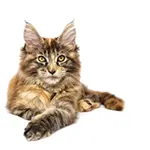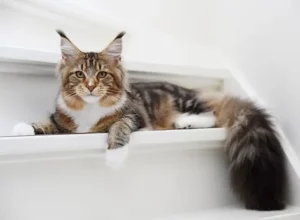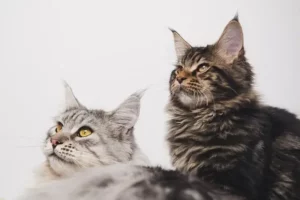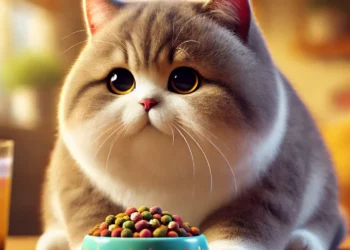
The Maine Coon bears a great physical resemblance to the Norwegian forest but, unlike the latter, it comes from the United States, specifically, the state of Maine.
Summary
The Maine Coon is one of the largest and most popular domesticated cat breeds in the world. Known for their impressive size, luxurious fur, and friendly personalities, Maine Coons have captivated the hearts of cat lovers for generations. Whether you are a current Maine Coon owner or considering adding one of these gentle giants to your family, this comprehensive guide will provide you with all the information you need to care for and understand this unique breed.
History of the Maine Coon
Origins and Legends
The origins of the Maine Coon cat are steeped in mystery and folklore. One popular legend suggests that Maine Coons are the result of a crossbreeding between domestic cats and raccoons, which explains their bushy tails and tufted ears. However, this theory is biologically impossible. Another tale links the breed to Marie Antoinette, who supposedly sent her pet cats to America when she was fleeing France. These cats are said to have mated with local cats, leading to the development of the Maine Coon.
In reality, the Maine Coon likely originated from cats that were brought to North America by early European settlers. These cats adapted to the harsh New England climate, developing thick coats and rugged builds that helped them survive in the wild. The breed was first recognized in the state of Maine, which is how they got their name, and they became popular for their excellent hunting abilities and friendly nature.
Rise in Popularity
Maine Coons became a popular breed in the late 19th century, often showcased at early cat shows. However, their popularity declined in the early 20th century with the introduction of more exotic breeds. The Maine Coon experienced a resurgence in the 1950s and 1960s, and today, they are one of the most beloved and recognized cat breeds worldwide.
Physical Characteristics
Size and Build
The Maine Coon is one of the largest domesticated cat breeds, with males typically weighing between 13 to 18 pounds and females between 8 to 12 pounds, though some can weigh much more. They have a sturdy, muscular build with a broad chest, large paws, and a long, bushy tail. Maine Coons are slow to mature, often not reaching their full size until they are three to five years old.
Coat and Colors
Maine Coons have a dense, water-resistant coat that is perfect for the cold climates of New England. Their fur is medium to long, with shorter fur on the shoulders and longer tufts on the belly and tail. They have a prominent ruff of fur around their necks, which adds to their majestic appearance.
The breed comes in a wide variety of colors and patterns, including solid, tabby, bicolor, and more. Some of the most common colors include brown tabby, black, and white, but Maine Coons can also be found in shades of red, blue, and cream.
Distinctive Features
One of the most distinctive features of the Maine Coon is their tufted ears and toes, which help them navigate snowy environments. Their large, expressive eyes can range in color from green to gold, and they often have a square-shaped muzzle, giving them a lion-like appearance.
Personality and Temperament
Gentle Giants
Maine Coons are often referred to as “gentle giants” due to their large size and friendly, affectionate nature. They are known for being social, outgoing cats that enjoy the company of their human families. Unlike some other cat breeds, Maine Coons are not typically aloof; they thrive on interaction and are known to follow their owners from room to room.
Playful and Intelligent
Maine Coons are highly intelligent and playful cats. They enjoy interactive play and can be trained to perform tricks or walk on a leash. Their playful nature often persists well into adulthood, making them entertaining companions. Many Maine Coons enjoy playing with water, a trait that is unusual in most cat breeds but fitting for a breed with a history in the cold, wet climates of New England.
Interaction with Other Pets and Children
Maine Coons are known for their gentle and tolerant nature, making them excellent pets for families with children and other animals. They are generally good-natured and can get along well with dogs and other cats. Their sociable nature means they often do well in households where they are not the only pet.
Vocalizations
Maine Coons are also known for their unique vocalizations. Rather than the typical meow, they often chirp or trill, especially when they are excited or happy. These sounds are usually a sign of contentment and are one of the breed’s charming quirks.
Grooming and Maintenance
Coat Care
Despite their long fur, Maine Coons are relatively low-maintenance when it comes to grooming. Their fur is less prone to matting than that of other long-haired breeds, but regular brushing (at least two to three times a week) is still necessary to keep their coat in good condition and reduce shedding. Regular grooming also helps to prevent hairballs, which can be a common issue in long-haired cats.
During the shedding season (spring and fall), more frequent brushing may be needed to manage the extra fur. A metal comb or a slicker brush works well for reaching through their dense undercoat and removing loose hairs.
Dental and Nail Care
Like all cats, Maine Coons benefit from regular dental care. Brushing their teeth with a cat-specific toothpaste can help prevent dental issues such as tartar buildup and gum disease. It’s also important to trim their nails every few weeks to prevent overgrowth and to provide scratching posts to help them maintain their claws naturally.
Bathing
Although not all cats enjoy baths, some Maine Coons may tolerate or even enjoy the water, thanks to their semi-waterproof coats. If you choose to bathe your Maine Coon, it’s best to use a cat-specific shampoo and ensure the water is lukewarm. Regular baths are not typically necessary unless the cat has gotten into something dirty or has skin conditions that require it.
Diet and Nutrition
Nutritional Requirements
Maine Coons are large, muscular cats that require a diet high in quality protein to support their size and energy levels. Both wet and dry cat food can be part of their diet, but it’s important to choose products that are specifically formulated for large breeds or cats with higher energy needs.
The diet should be balanced and include essential nutrients like taurine, which is vital for heart health, and omega fatty acids to maintain a healthy coat. As Maine Coons are prone to obesity, portion control is crucial to prevent overfeeding.
Portion Control
Given their size, Maine Coons may require more food than smaller breeds, but it’s important to avoid free-feeding, as they can easily become overweight. Feeding them at specific times each day with measured portions based on their age, weight, and activity level is the best way to manage their diet. Consult with your veterinarian to determine the right feeding plan for your Maine Coon.
Hydration
Maine Coons need to stay well-hydrated, especially if they eat dry food. Providing fresh water at all times is essential, and some cats prefer running water from a cat fountain. Wet food can also contribute to their overall hydration, which is important for their urinary health.
Health and Lifespan
Common Health Issues
Maine Coons are generally a healthy breed, but they are prone to certain genetic and hereditary health issues. Some of the most common conditions include:
- Hypertrophic Cardiomyopathy (HCM): A common heart condition in Maine Coons, where the heart muscle becomes abnormally thickened. Regular heart screenings are recommended to detect this condition early.
- Hip Dysplasia: Due to their large size, Maine Coons can be prone to hip dysplasia, a condition where the hip joint doesn’t fit properly into the hip socket. This can lead to arthritis and mobility issues.
- Spinal Muscular Atrophy (SMA): A genetic disorder that affects the spinal cord, leading to muscle weakness and atrophy. While it does not cause pain, it can affect a cat’s mobility.
Lifespan
With proper care and regular veterinary check-ups, Maine Coons typically live between 12 to 15 years, although some can live longer. Ensuring they have a balanced diet, plenty of exercise, and regular health screenings can help them lead a long, healthy life.
Tips for Living with a Maine Coon
Provide Space for Exercise
Maine Coons are large and energetic cats that need plenty of space to move around. Ensure your home has enough room for them to run, jump, and climb. Cat trees, scratching posts, and interactive toys can help keep them physically active and mentally stimulated.
Regular Veterinary Care
Due to their susceptibility to certain genetic conditions, regular veterinary check-ups are essential for Maine Coons. Annual or bi-annual visits will help monitor their health and detectHere is the completion of the article on Maine Coon cats:
Regular Veterinary Care
Due to their susceptibility to certain genetic conditions, regular veterinary check-ups are essential for Maine Coons. Annual or bi-annual visits will help monitor their health and detect any issues early, especially conditions like Hypertrophic Cardiomyopathy (HCM) or Hip Dysplasia. Regular dental check-ups are also important, as Maine Coons can be prone to dental issues if their oral health is not maintained.
Social Interaction
Maine Coons are social animals that enjoy the company of their human family members and other pets. Make sure to spend quality time interacting with your Maine Coon, whether it’s through play, grooming, or simply keeping them company. They don’t like being left alone for long periods, so if your household is often empty, consider getting another pet to keep them company.
Grooming Routine
Establish a regular grooming routine from a young age to keep your Maine Coon’s coat in top condition. This not only helps maintain their appearance but also strengthens the bond between you and your cat. Regular grooming sessions also provide an opportunity to check for any signs of health problems, such as lumps, bumps, or skin issues.
FAQs about Maine Coon Cats
Are Maine Coons good with children?
Yes, Maine Coons are known for their gentle and patient nature, making them excellent companions for families with children. They are tolerant and enjoy playing, making them a great match for active households.
How much grooming do Maine Coons require?
Maine Coons have long, thick fur that requires regular grooming to prevent matting and reduce shedding. Brushing them two to three times a week is recommended, with more frequent grooming during shedding seasons.
Do Maine Coons get along with other pets?
Maine Coons generally get along well with other pets, including dogs and other cats. Their sociable and tolerant nature makes them a good fit for multi-pet households.
What health issues are common in Maine Coons?
Maine Coons are prone to certain genetic health issues, including Hypertrophic Cardiomyopathy (HCM), Hip Dysplasia, and Spinal Muscular Atrophy (SMA). Regular veterinary check-ups and genetic testing can help manage these risks.
How long do Maine Coons live?
With proper care, Maine Coons typically live between 12 to 15 years, although some can live longer. Ensuring a balanced diet, regular exercise, and routine health check-ups can help them live a long, healthy life.
Latest on CatOlympus
Effects Of Music On Cats: Do Cats Enjoy Music?
For many cat owners, music is a regular part of daily life. We play it while cooking, cleaning, relaxing, or...
Myths And Truths About Feeding Your Cat
Feeding your cat is more than just picking up the nearest bag of kibble. It’s about providing balanced nutrition to...
How To Ensure Your Cat Drinks Enough Water
Water is essential for life, and just like humans, cats need adequate hydration to maintain their health and well-being. However,...
How to Spot and Prevent Parasites In Cats
Parasites are an unfortunate but common issue that many cat owners will face at some point. These unwelcome visitors can...











